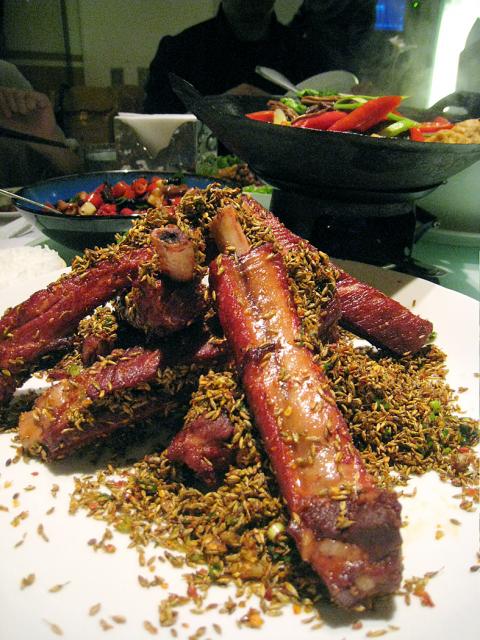1010 Hunan Cuisine (1010湘辣料理), an undertaking by the Tai Tong Food & Beverage Group (瓦城泰統集團), which already has two successful chain restaurants — Thai Town (瓦城) and Very Thai (非常泰) — under its belt, shares many similarities with its Thai-inspired counterparts. Located on the sixth floor of the Eslite Bookstore Xinyi Branch (信義誠品書店), it boasts a clean-cut interior, a family-friendly atmosphere and a menu that alters traditional recipes to cater to the popular palate.
I was unable to book a table one day before a planned meal on a recent Sunday evening. Sensing my disappointment over the phone, the staff person suggested that my group come before 6pm to avoid a long wait. One hour after arriving, our six-person party was seated in a brightly lit dining area featuring a soothing color scheme of light wood brown and pastel white.
The menu begins with the restaurant’s top 10 dishes, which could be seen on many of the dining tables. The fried pork ribs with chili and fennel spices (神仙孜然肋排骨, NT$130 per rib) was a mouthwatering highlight. First marinated with dozens of spices and then deep-fried to a crisp golden brown with different types of chili, the ribs burst with meaty juiciness, while a thin, fried layer of cumin added a delightful crunchiness.

Photo: Ho Yi, Taipei Times
The restaurant’s rendition of hot pot of preserved tofu and pork intestine (臭豆腐肥腸干鍋, NT$380) is a standard mixture of chunks of congealed pig blood, intestines and tofu that absorb the savory broth, which is flavored with lashings of chili and chopped scallion. However, when the fried chicken meat, heart and gizzards Hunan style (鄉巴佬炒雞, NT$280) and fried chicken with red chili (辣子尋雞丁, NT$280) arrived, the heaps of chilies started to lose their novelty value, and a few of my dining companions complained that the chili was too mild and had been toned down to suit popular tastes.
Among the disappointments on our table was the fish ball and spinach soup (菠菜魚丸湯, NT$250 or NT$320), which was as insipid as it sounds.
Another highlight of the meal, buns with condensed milk (金銀饅頭, NT$120 for six buns), available steamed or deep-fried, offered a brief escape from the bombardment of flavors.
The restaurant has a small vegetarian menu that includes sauteed shredded potato with vinegar (醋溜土豆絲, NT$180), which has a pleasant tartness and makes a good appetizer.
For a group of three to six, a selection from the set menu, which features many of the restaurant’s signature dishes, costs NT$450 per person plus a 10 percent service charge.
1010 Hunan Cuisine operates two other venues in Taipei and two in Taichung. For more information, visit the restaurant’s Web site at www.1010restaurant.com.

Most heroes are remembered for the battles they fought. Taiwan’s Black Bat Squadron is remembered for flying into Chinese airspace 838 times between 1953 and 1967, and for the 148 men whose sacrifice bought the intelligence that kept Taiwan secure. Two-thirds of the squadron died carrying out missions most people wouldn’t learn about for another 40 years. The squadron lost 15 aircraft and 148 crew members over those 14 years, making it the deadliest unit in Taiwan’s military history by casualty rate. They flew at night, often at low altitudes, straight into some of the most heavily defended airspace in Asia.

Beijing’s ironic, abusive tantrums aimed at Japan since Japanese Prime Minister Sanae Takaichi publicly stated that a Taiwan contingency would be an existential crisis for Japan, have revealed for all the world to see that the People’s Republic of China (PRC) lusts after Okinawa. We all owe Takaichi a debt of thanks for getting the PRC to make that public. The PRC and its netizens, taking their cue from the Chinese Communist Party (CCP), are presenting Okinawa by mirroring the claims about Taiwan. Official PRC propaganda organs began to wax lyrical about Okinawa’s “unsettled status” beginning last month. A Global

Taiwan’s democracy is at risk. Be very alarmed. This is not a drill. The current constitutional crisis progressed slowly, then suddenly. Political tensions, partisan hostility and emotions are all running high right when cool heads and calm negotiation are most needed. Oxford defines brinkmanship as: “The art or practice of pursuing a dangerous policy to the limits of safety before stopping, especially in politics.” It says the term comes from a quote from a 1956 Cold War interview with then-American Secretary of State John Foster Dulles, when he said: ‘The ability to get to the verge without getting into the war is

Like much in the world today, theater has experienced major disruptions over the six years since COVID-19. The pandemic, the war in Ukraine and social media have created a new normal of geopolitical and information uncertainty, and the performing arts are not immune to these effects. “Ten years ago people wanted to come to the theater to engage with important issues, but now the Internet allows them to engage with those issues powerfully and immediately,” said Faith Tan, programming director of the Esplanade in Singapore, speaking last week in Japan. “One reaction to unpredictability has been a renewed emphasis on